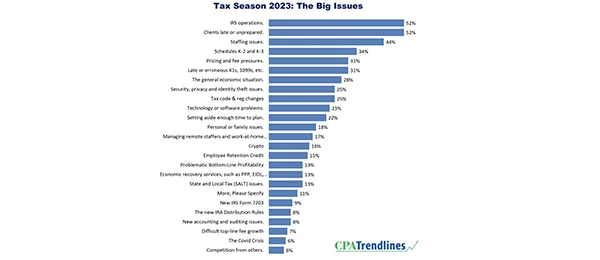
 Infinity Globus
Infinity Globus
 15 Jul 2023
15 Jul 2023
As tax season approaches, it’s essential for CPAs to prepare and position themselves for a smooth and successful time. There are several key considerations that every CPA should highly prioritize one month before tax season officially begins.
By addressing these factors in advance, CPAs can streamline their processes, improve client service, and reduce stress during the busiest time of the year. Let’s discuss 12 important things that every CPA should highly consider before starting tax season.
1. Review Tax Law Changes
It is important to review and update your tax return checklist one month before tax season. Checklists should be comprehensive, organized, and tailored to the specific needs of distinct client types.
Update the checklists with any new tax rules & regulations, or changes that may impact the upcoming tax season. Having well-structured checklists will help you stay organized, minimize errors, and ensure compliance with all relevant tax regulations.
Organize sessions for your staff members to update their knowledge of tax regulations, software usage, and any new processes or procedures for the upcoming tax season.
2. Check for Software Update
Check that your accounting software is up-to-date on the most recent tax laws. This will help you in avoiding errors and delays.
If your firm uses a client portal or secure file-sharing system, make sure it’s updated and functioning correctly. Inform clients about the portal and the benefits of using it to securely exchange documents.
3. Review Fee Structure
Evaluate your fee structure and update it if necessary. Ensure that any changes in pricing or billing procedures for the forthcoming tax season are communicated to clients.
Review and amend client engagement letters to accurately reflect the scope of services, fees, and any changes in policies or procedures. Send updated engagement letters to clients for their acknowledgment.
4. Review Internal Processes
To maximize productivity throughout the tax season, evaluate and streamline your internal processes. Identify where improvements can be made to increase productivity and reduce errors.
Create a workflow strategy or timeline for your firm to efficiently manage the surge of tax returns. To ensure a seamless process, assign roles and responsibilities to staff members.
5. Monitor Deadlines
Familiarize yourself with approaching tax deadlines, such as estimated tax payments, filing deadlines, and extensions. Also, set reminders to ensure timely compliance.
6. Secure Data Management
Inspect and enhance your data security measures to protect client information. Implement encryption, firewalls, and secure backup systems to safeguard their sensitive data.
Take a secure backup of all client data and tax files. Implement a backup strategy to avoid data loss or system failure.
7. Evaluate Resource Needs
Assess your staffing needs and consider whether additional resources, such as seasonal employees or interns, are required to handle the increased workload during tax season.
8. Review Professional Development Requirements
Examine your records to see if you have completed any outstanding continuing professional education (CPE) requirements. Schedule any necessary CPE courses to stay compliant and up to date.
9. Client Communication Plan
Develop a communication strategy to keep clients informed throughout the tax season. Make a schedule for sending newsletters, tax updates, or reminders about important deadlines.
Offer them additional services during tax season, such as tax planning, financial advice, or retirement planning. Inform them about these services and their potential advantages.
Also, reach out to your existing clients to inform about the upcoming tax season. Make a list of the client information and documents that you require for tax preparation. Remind them of important dates, document requirements, and any tax law changes that may impact their returns.
As mentioned in CPA Trendlines, clients late or unprepared is the topmost issue faced in tax season 2023.

10. Double-Check Client Data
Check the accuracy and completeness of the client data. Ensure that all relevant client information, such as contact information, addresses, and social security numbers, is up to date.
11. Prepare for E-Filing
Ensure that your e-filing systems are up to date and compliant with the most recent requirements. Test the e-filing process to verify that it runs smoothly and securely.
12. Get Ready for Tax Season Kickoff
Prepare your workplace for tax season to begin. Make sure that you have the necessary supplies, forms, and resources readily available to efficiently handle client interactions and inquiries.
By taking the time to consider these crucial aspects one month before tax season, CPAs can set themselves up for success. Remember, planning and preparation are the foundation for providing exceptional service and achieving professional growth during this difficult time. Embrace these considerations, stay organized, and tackle tax season with confidence and competence.
Navigate the tax season seamlessly with our informative blogs and resources, especially crafted for you:
Ultimate Guide to Survive Tax Season for CPAs
Multiply Your Growth Rate by Outsourcing Tax Preparation (During Tax Seasons)
CPA & Accounting Firms: 6 Tactics for Better Work-Life Balance (During Tax Seasons)
What Should CPA & Accounting Firms Learn at the End of Tax Season?




